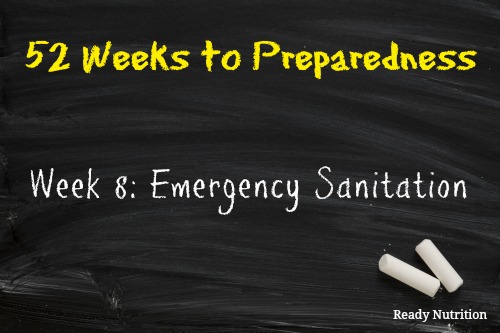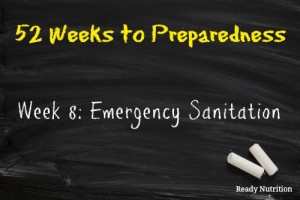 [1]
[1]The odor alone would be enough of a nightmare to face, but what about what is inside the trash itself (i.e., dirty diapers, contaminated medical supplies, rotting meat and food)? This type of situation would cause E. coli and bacteria to invade most everything that you touch. If a situation like this was allowed to fester, the potential for diseases and epidemics would create an entire new disaster to be dealt with.
No one really wants to discuss sanitation because it’s an unpleasant and dirty subject; however, it is one of the most important areas to focus on when preparing for a disaster. In a disaster where water resources are compromised, people within a 50 mile radius could be adversely impacted by illness and disease just if one person handled the trash improperly. When trash cannot be picked up, it must be burned or buried by you; however, municipalities cannot risk contamination to the water source or soil from people who incorrectly bury their debris, so it is important to know how to properly dispose of your waste products.
If you find yourself in a situation where toilet paper is not available, you may have to resort to a more natural method of being hygienically clean. Below is a list of toilet paper alternatives for an emergency situation.
Toilet Paper Alternatives
- Leaves
- Phone books
- Unused coffee filters
- Corn cobs (That’s right- Corn Cobs)
- Dilapidated kitchen towels (no longer used for cleaning).
- Bed linen strips
- Mail order catalog
Don’t forget that women [2] need to have sanitation items stored for emergencies. Prevention is the key to spreading communicable diseases, so prepare appropriately. If water services are interrupted during a short term emergency, consider these alternatives:
- Clean and empty the water of the toilet bowl out.
- Line the bowl with a heavy-duty plastic bag.
- Once the bag has waste, add a small amount of disinfectant and deodorant (e.g. cat litter) and securely tie the bag and dispose of it.
- A large plastic trash can (lined with a heavy duty bag) can be used to store the bags of waste. Once waste services begin, the city will come and collect these.
- If waste services do not begin, then you may need to consider burning or burying your waste. If you decide to do so, there are factors you need to consider. Click here [3] to learn more.
Long Term Disasters
Sanitation during a long term disaster requires the same sanitation supplies used in a short term disaster; however, a more permanent structure, (e.g., a latrine) must be put into place for long term use.
Having a sanitation kit ready for a disaster is essential to keeping your family and neighbors healthy. These kits fit easily into a bucket, and they are affordable. Also, having a natural alternative to cleaning yourself is a proactive way to prepare for better sanitation practices. This article shows you ways of making your own hand sanitizer [4] by using natural ingredients.
Your suggested preps to buy this week will specifically target creating a sanitation kit.
Preps to buy:
- Disposable bucket or luggable-loo [5]
- Toilet paper (1 roll per family member for each week)
- 1-2 rolls of paper towels
- Diapers for infants
- Additional infant supplies (baby wipes, diaper rash cream, etc)
- Rubber gloves
- Sanitation items for women (at least one- month supply)
- Garbage bags with twist ties ( i.e., to line toilets or luggable-loo)
- Bleach
- Cat Litter or absorbent material (i.e., saw dust or dirt)
- Baking soda (for eliminate odors)
- Vinegar
- Shovel
- Soap or antibacterial cleanser (one per family member)
Action Items:
1. Create a sanitation kit for your family.
2. If you are preparing a sanitation kit with infants in mind, ensure that you have accounted for their short- and long-term needs (see list above).
3. Familiarize yourself with different methods of handling the sanitation problems that arise during short- and long-term emergencies.
